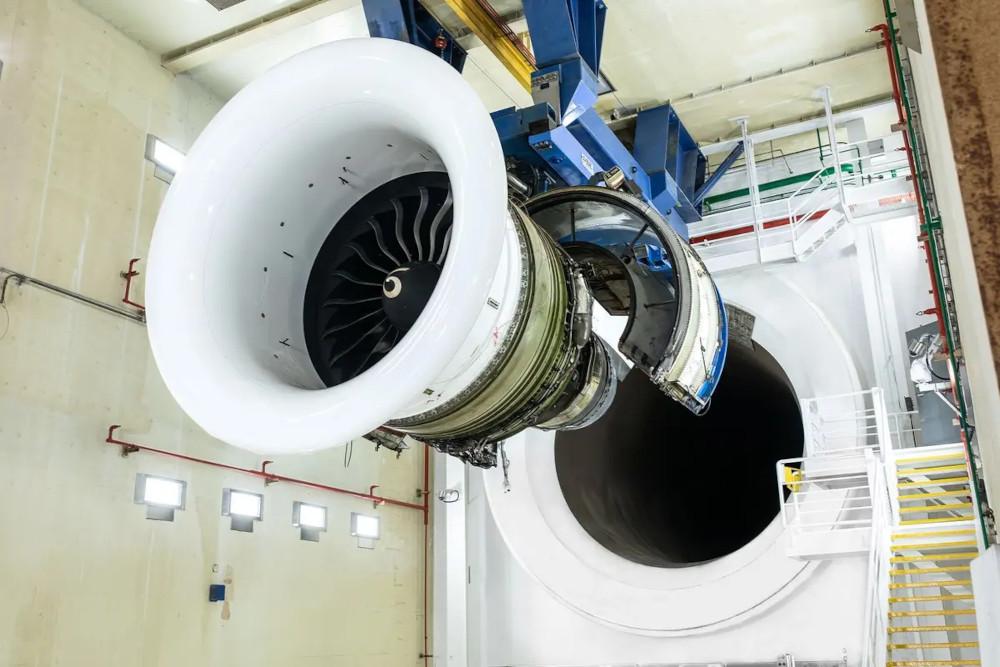
HONG KONG—MRO provider HAECO says it is committed to its long-term investment and strategy goals across the business despite recent uncertainties emanating from Trump administration tariffs and an escalating U.S.-China trade war.
Speaking at Aviation Week’s Aero Engines Asia-Pacific conference in Hong Kong on Wednesday (April 23), Richard Sell, CEO of HAECO Group, says a healthy aftermarket landscape driven by several years of sustained demand has been tempered to some degree since the U.S. government imposed protective tariffs affecting nearly all goods imported into the country earlier this month.
HAECO, which has businesses in both China and the U.S., is now facing a more uncertain period compared to the more buoyant landscape of just a few weeks ago. “The uncertainty surrounding this topic is significant and it's top of mind for all of us. It affects everything from material cost to supply chain stability,” says Sell. “The pace of developments on a daily basis is presenting real challenges for all of us in terms of our long-term planning.”
Despite this, Sell says the company is not paring back on its any of its investments or long-term strategies. “We're not changing our thinking about our strategy, but we will have to be agile to what happens in the near term,” he says.
The imposing of tariffs has seen a baseline of 10% attached to all goods imported to the U.S., while at the higher end of the scale, Chinese exports to the U.S. face up to 245% tariffs, which has led to China imposing a 125% charge on U.S. goods.
“There’s a lot of dialog with customers right now and we don't see that having a major impact on volumes coming through our businesses and capacity and planning are relatively steady state, but we will have to stay nimble as this all unfolds,” he says.
Sell believes that in the near term, the impact of tariffs could be somewhat limited given some of its key MRO businesses operate out of Hong Kong and in Xiamen, China, which affords the company free trade zone protections. “We understand that on the services side, a lot of that activity will be exempt work, therefore, performed for foreign airlines, is likely to be out of scope. The analysis that we've done up until this point suggests that, yes, there will be some impact at the edges, but it's not likely to be dramatic.”
However, longer term, Sell concedes that this could all change quickly given the fast-moving nature of the issue. “That’s the view on April 23 but on April 24, who knows? Because this is moving so fast, and that's the large part of what's creating this huge uncertainty, where do we go from here? What does the end result look like?”
HAECO expects to see some areas of the business double over the next 10 years and plans to support this by investing significantly in its airframe, engine and components divisions.
For airframe maintenance, he identifies an opportunity to broaden out from its China, Hong Kong and U.S. locations. “We’re looking at a couple of interesting opportunities there, probably Asia Pacific, but still to be determined,” he adds. While smaller in scale, its component repair shops, primarily in China, have potential to grow as the company takes on more products and components.
However, it is in the engine MRO segment where Sell sees “great scope” for growth. The company’s HAECO Engine Services in Xiamen expanded its agreement with GE Aerospace until 2040 for GE90 offload work last year while also securing a place in the future GE9X repair network. Meanwhile, its Hong Kong Aero Engine Services (HAESL) joint venture business with Rolls-Royce recently started handling Trent 1000 engine modules and Sell says the portfolio will be broadened further in future.
Its HAECO Global Engine Support business, comprised of locations in Hong Kong, London, Amsterdam and Dallas, could also be expanded to another location either in the Middle East or India, Sell says.





